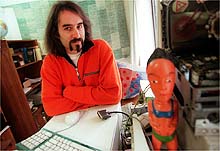 OR John Fekner, a pixel is as good as a drop of paint.
OR John Fekner, a pixel is as good as a drop of paint.
Mr. Fekner, an artist in Long Island City, N.Y., has been using computers in his work since 1981. In "faster/fear," a recent video installation, a television built into a cabinet displays words that Mr. Fekner has animated with a software program. The jagged, pixilated edge of each computer-generated letter appeals to Mr. Fekner because it is characteristic of the medium. "It's almost like the drip in a Jackson Pollock," Mr. Fekner said.
To many people, computer art means viewing a tiny Renoir reproduction on a museum Web site or selling a painting through eBay. But since the early 60's, artists have been adding computers to their expressive palette. Sometimes, as in the works of the artists you see here, they are a tool for shaping a new image; for others, the screen becomes the canvas on which the final work is shown.
On the Web site "Multimedia: From Wagner to Virtual Reality" (www.zakros.com/wvr/wvr.html), Randall Packer, an artist and composer in Washington, documents how new technological tools have transformed the arts in the 20th century. "Artists are always trying to redefine art and find new ways to express themselves," Mr. Packer said. "Tools are the way to do that."
 |

|
 | |
Chris Maynard for The New York Times | | Andy Deck is a New York City artist who uses computers. |
|
 |
 |
 |

Related Sites
These sites are not part of The New York Times on the Web, and The Times has no control over their content or availability.
www.zakros.com/wvr/wvr.html
 |
 |
 |
 |
 |
 |
 |
 |
 |
 |
|
 |
 |
|
|
|
|
|
 |
|
A new generation has already turned to the Internet as a creative medium. Andy Deck, a New York artist whose online gallery can be found at Artcontext.com, said, "It's a lot easier to figure out how to do something that's never been done before with a medium that never existed before." The Internet, he said, has economic and aesthetic advantages: "I can send my work through my phone line. It makes distribution affordable, while at the same time leaving me free to make whatever I please."
In addition to working with computers, Mr. Fekner spray-paints graffiti, records songs and makes videos, all in a quest, he said, to reach an audience "other than someone who is going to walk into a gallery." Similarly, he recently put up his own Web- based showcase at www.liu.edu/johnfekner. Because of technology's relentless advance, he is not sure how much longer he can be called a computer artist.
"The word `computer' could become dated," he said. "I could be a molecular artist next."